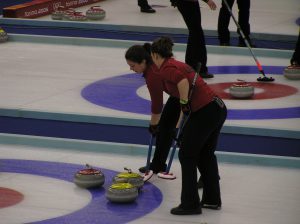 For years, Maureen Brunt Clark ’12 gave a lot of time to the sport of curling. When her competitive curling days ended and she enrolled at William Mitchell in 2009, all that practice time on the ice shifted to study time in the library.
For years, Maureen Brunt Clark ’12 gave a lot of time to the sport of curling. When her competitive curling days ended and she enrolled at William Mitchell in 2009, all that practice time on the ice shifted to study time in the library.
Clark came to law school as an Olympian, having competed in Italy in 2006 on the U.S. women’s curling team. Since earning her J.D. from what is now Mitchell Hamline School of Law, she’s become a vice president and senior corporate counsel for U.S. Bank in Minneapolis.
With the world’s attention again on the sport, Clark finds herself an ambassador for curling, encouraging anyone who’s intrigued by it to try it out.

Maureen Brunt Clark ’12, competing in the 2006 Olympics in Italy (submitted photo)
She grew up in Wisconsin and started curling at age six, then competitively as a teenager. “Curling was a family event,” she told the ABA Journal in a recent interview. “Everyone in my hometown knew what curling was. Not only did my high school have a curling team, but it was offered as part of physical education class in high school.”
She won several state and national championships in high school and continued competing while attending the University of Wisconsin. In February 2005, her team qualified for the Olympics with their first-place finish at the Olympic trials, which were held in Wisconsin that year. The following month, her team won silver at the world championships in Scotland.
At the 2006 Olympics, Team USA finished in eighth place, but Clark has fond memories of the trip. After failing to qualify for the 2010 Games, she opted for law school. She told the ABA Journal she was motivated by a lifelong love for reading and learning.
By the end of her first year at Mitchell, Clark was struck by some of the similarities between competitive curling and law school. “People new to curling might see people just sliding and sweeping on ice,” she said. “But the goal is to slide those stones in a way that places them in a precise spot.

Maureen Clark ’12 and her husband Jason
“There’s an underappreciated mental focus needed for curling that definitely was helpful for law school.”
Clark also recalls the bonds she formed with the classmates in her section as comparable to being on a team. “No matter what happens in the future, we had all survived the same experience together [the first year of law school],” she said. “In a much deeper way, that’s what happens with your team over the years after you travel together, eat meals together, and work to achieve the same goal.”
Clark, 39, also noted an important curling lesson for attorneys. “The tiniest wobble can make a huge difference in curling,” she told ABA Journal. “How you speak to a client or draft a contract also requires a lot of precision.”
Read more about Clark’s Olympic experience in this ABA Journal article
